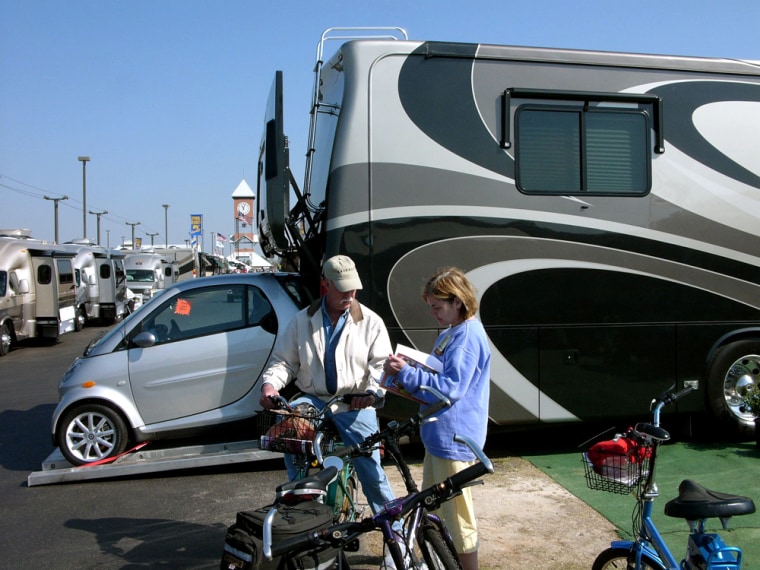About 20,000 motor-home owners and industry representatives gathered this week in the heart of Georgia to socialize, attend seminars and kick the tires of more than 1,000 enticing new models — some costing more than $1 million a pop and getting only 6 miles per gallon.
With gas prices climbing in recent years, the turnout at the Family Motor Coach Association’s 77th International Convention is much better than most outsiders would expect. The recreational vehicle industry is reporting record sales for the past five years, despite rising costs at the pump. Insiders credit a growing number of baby boomers who want the gas-guzzling vehicles for retirement and younger families opting for vacations closer to home for offsetting any potential losses because of soaring fuel costs.
“There’s no better way to do it,” said Bob Dalton, 70, who has owned a motor home for 30 years. “I can sleep in my own bed and I can eat my own food. I travel at my own pace. I go where I want.”
Since March 2005, when the association last held a convention in Perry, about 100 miles south of Atlanta, the price of regular self-service gasoline has increased 21 percent, from $2.10 to $2.55 per gallon, according to the Lundberg Survey of 7,000 gas stations across the country.
So far, the higher fuel prices seem to have had little, if any, impact on Americans who vacation with recreational vehicles, which include simple pop-up campers, travel trailers towed by pickup trucks or SUVs and motor homes.
“If you can afford $600,000 for a coach, what’s the difference between $2.50 or $3.00 per gallon,” said Dalton, a military retiree. “It does affect me. I drive less and stay longer.”
The Recreational Vehicle Industry Association, which represents 550 manufacturers and suppliers, has been reporting record sales in recent years. Sales are expected to dip a little this year, but, despite that, 2007 still looks to be the fourth best in the past 30 years, said Kevin Broom, an association spokesman.
Broom cited favorable interest rates, the success of an industry program to attract younger buyers and a switch from flying to other modes of vacation travel since the Sept. 11, 2001, terrorist attacks.
“RVs are the most cost effective way to vacation for a family, even when you factor in the cost of fuel,” Broom said, citing the common vacation costs of hotels, restaurants and rental cars that can be avoided or lowered when using a RV.
Mark Tuggle, sales manager for Douglasville-based John Bleakley Motor Homes, Georgia’s largest motor home dealership, said the younger buyers are a new phenomenon.
“If they weren’t gray headed and had handicapped sticker, sales people would shy away from them,” Tuggle said. “Now they can be 32 years old and have two kids and you need to pay attention to them.”
The appeal for young families, especially those living in urban areas, is that they can spend a weekend in a campground and return Sunday evening “feeling like they’ve been on vacation,” Tuggle said.
The influx of younger RVers still wasn’t apparent at the motor home convention, which ends Thursday. Many were gray-haired retirees. Some limped around the vast exhibit area. Others zipped around on bicycles and golf carts.
A few appeared to be baby boomers — people born between 1946 and 1964 who are reaching retirement age with company-sponsored 401(k) retirement plans and similar employer-backed programs.
“Baby boomers have more expendable income,” said Dave Uhlenbrock, spokesman for the motor coach association, which has 120,000 family members.
“The baby boomers are looking at motor homes ... when they consider their travel options,” he said. “They can do what they did at home in a motor home. There are motor homes with washers and driers, lovely shower areas, satellite TV and Wi-Fi. They call them land yachts and they truly are.”
Manufacturers and conventioneers filled the 1,700-acre site with thousands of motor homes, ranging from small, diesel-powered models that cost about $90,000 and travel 22 to 26 miles per gallon, to high-end models with satellite television, leather upholstery, tile floors and marble countertops. These 40- to 42-foot mobile manors cost $600,000 to $1.3 million and get only 6 to 8 miles per gallon.
Dalton and many others stopped to admire a luxurious $382,000 motor home with a surprise inside. The 41-foot Travel Supreme gets only 6 to 8 miles per gallon, but nestled in its rear compartment is a tiny, fuel-efficient Smart car, a creation of Daimler Chrysler’s Mercedes Car Group, rated at 40 mpg.
Drivers lower a ramp and back it out of the compartment for trips to monuments or grocery stores.
Dalton said he and his wife, Fran, who live in nearby Bonaire, put about 20,000 miles a year on their 40-foot motor home that gets about 8 miles per gallon.
They’re planning to visit western Canada and the Badlands of South Dakota this summer. In the past, they would have done that in two separate trips, but to stretch their gas dollars, they’ll now make only one go at it.
“There are still so many places I want to see,” he said.
